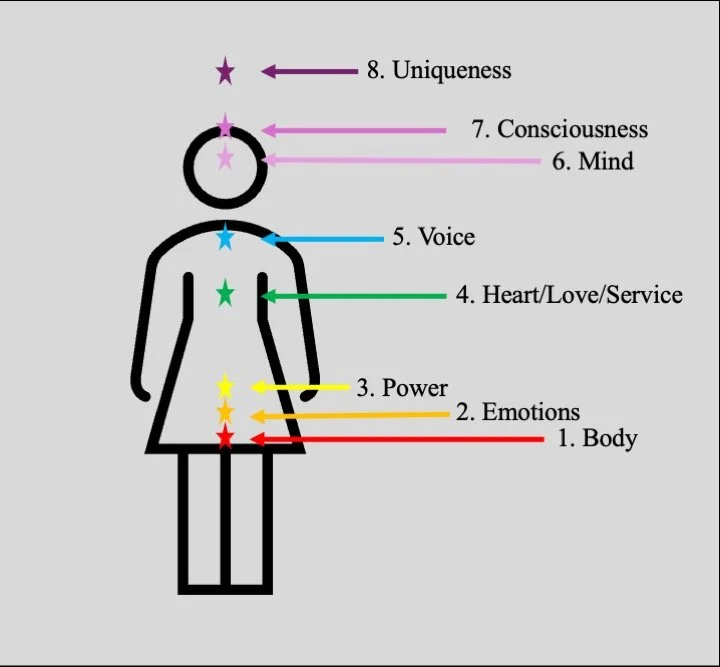Domains and Stages
of Awakening
The iConscious Model developed by Ted Strauss and Carole Griggs is a developmental model based on Ken Wilbur’s Integral Model incorporating various human development models from leaders of psychology over the last century. The iConscious model also takes into account Maslow’s Hierarchy of Needs because when we recognize our current needs and fulfill them, we open the possibility of accelerating our physical, emotional, conscious and spiritual evolution.
Domains Correlated with Chakras
The iConscious model has 14 stages that span 3 phases of the transformational journey - Dual, Unified and Singular, and breaks the development into 5 specific domains of human experience and 4 views -Subjective, Observable, Relational Systemic. It is an excellent model for understanding your developmental level(s) at this time. By knowing where you fall developmentally allows you to get practices that meet you on your evolutionary edge. Even though I am trained as an iConscious coach, I feel the model could differentiate aspects of the developmental process so I have expanded this to 8 domains of awakening which I correlate with the chakra system.
Domains
Body includes is our physical organism including its structure, behavior, responses, processes and movement as well as how we relate to our body
Emotions includes our ability to feel and process the complexity of many emotional realities
Power is our ability to stand in the truth of who we are and to express our authentic nature
Heart/Love/Service is our capacity to accept everyone and everything just as they are and to give of ourselves to the world
Voice is our ability to speak our truth and wisdom
Mind includes our relationship with our thoughts and beliefs, our capacity for mental complexity and our ability to take in many perspectives
Consciousness is the awareness that registers our experience
Uniqueness - all the ways we are unique from our DNA to our personality and all the ways we think, feel and act
Click on the Domain Name to learn more
The Four Views / Quadrants
Our spiritual journey and everyday lives don’t occur in a vacuum. We are 8 billion people trying to get through each day and we can only do this by interacting with others and the world. Integrating the four views / quadrants on the spiritual journey is essential because it honors the full spectrum of what it means to be human. Spiritual growth isn't just an inner, personal awakening, it also involves how we relate to our bodies, behaviors, relationships, communities, and the larger systems we live within. By including all four views / quadrants, 1) our inner experience (“I”), 2) our physical embodiment and actions (“It”), 3) our shared cultural meanings (“We”), and 4) the outer systems and environments we co-create (“Its”), we ensure that spiritual development is not isolated or abstract. Instead, it becomes grounded, relational, and responsive to the real world. Without this integration, spirituality can become unbalanced: overly internal, disconnected from action, blind to cultural context, or unaware of systemic impact. An integrated approach weaves these dimensions together, allowing our awakening to be both deeply personal and profoundly engaged with life.
Click here to learn more about the Four Views / Quadrants
Phase 1 - Dual
“In Phase 1, we experience life and self as partial, fractured, confining, and disconnected. We can feel separate from ourselves and from others, lost, or confused about who we are and what we’re doing here. There is often a sense of searching for oneself, along with a felt sense of something missing, lacking, or not enough. In the earlier part of the Dual Phase, life is seen as filled with conflicting polarities, such as good versus bad, right versus wrong, me versus you, us versus them, etc. Toward the end of Phase 1, we begin to see and accept the “both/and” and fluid gray zones of life. We yearn for an end to our suffering, our war with self and life, and a unification of our personal self with transpersonal nature, which is finally fulfilled in Phase 2." - From Ted Strauss, Carole Griggs PhD. iConscious: Accelerating Human Potential (p. 65). Kindle Edition.
Stage 1 - Survival Stage 2 - Self-Centric Stage 3 - Conforming
Stage 4 - Rational Striving Stage 5 - Equality/Harmony Stage 6 - Inclusive
Stage 7 - Awakening Stage 8 - Oscillating
Click here to learn more
about the Stages 1 - 8
Phase 2 - Unified
“In the Unified Phase, all Domains are known as whole, unified, connected, and integrated. In this Phase we have dropped out of fundamental resistance to what is, and awakened into union with life and self. This transition is experienced as far more profound than the shift of identity into consciousness in Stage 7. This is a shift into seeing infinite and finite as a single thing. It becomes a new platform for life that is radically different from that in the Dual Phase. Part of what happens during the Unified Phase is that we notice there’s no boundary between “inside” and “outside”. The experience of unity makes it clear that absolute and relative, personal and impersonal, inside and outside, are all the same. This is a truly massive shift in perspective that will radically change your life for the better because it will make you feel deeply part of the world.” - From Ted Strauss, Carole Griggs PhD. iConscious: Accelerating Human Potential (pp. 164-165). Kindle Edition.
Stage 9 - Embodied Unity Stage 10 - Transforming
Stage 11- Individuating Stage 12 - Living Potential
Click on here to learn more
about the Stages 9 - 12
Phase 3 - Singular
“As the Singular Phase dawns, there is a remarkable dissolution of what previously was felt as a subject/object perspective. That is, we felt we were a subject here, having an experience with people and things over there. Even in the Unified Phase, there was always a “me” and an “other”. But the shift into Singular Realization removes the “me” from that perspective, leaving only what is. This experience of seamless non-separation, or what some call “non-duality”, starts by removing your sense of self from the center of your own being. For others, a better description is that the awareness of ‘what is’ becomes far more dominant than the awareness of all previous senses of self, including, and especially, the awakened ones. You discover that your life is far freer and more impactful without a sense of separate self getting in the way.” - From Ted Strauss, Carole Griggs PhD. iConscious: Accelerating Human Potential (pp. 220-221). Kindle Edition.
Stage 13 - Singular Realization Stage 14 - Flow
Click on here to learn more
about the Stages 13 & 14


